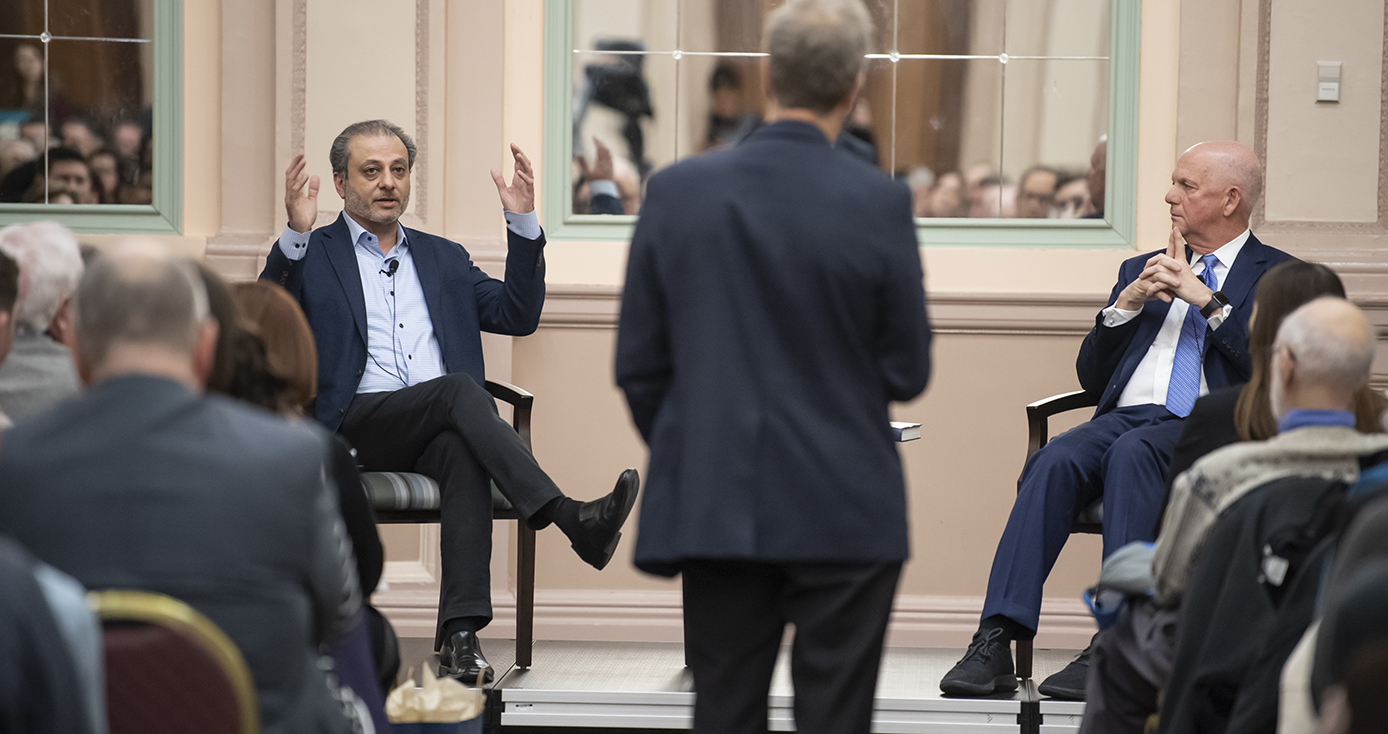
Subscribe to Pittwire Today
Get the most interesting and important stories from the University of Pittsburgh.U.S. Department of Justice, News of the Day Topics of Pitt Cyber Event
More than 300 guests packed the William Pitt Union Ballroom on Feb. 13 to hear a conversation between former U.S. Attorneys Preet Bharara the University of Pittsburgh Institute for Cyber Law, Policy and Security Founding Director David Hickton. The crowd size for such a discussion may have been a pleasant surprise a few years ago but public interest in legal matters is business as usual today, according to Bharara.
“There have never been so many former federal prosecutors on television and on radio and in the editorial pages ever. Nobody really cared what we said unless it was in a court of law,” Bharara said.
Can democracy survive the internet?
University of Pittsburgh Institute for Cyber Law, Policy and Security Founding Director David Hickton will deliver the lecture, “Can Democracy Survive the Internet” for the Dick Thornburgh Forum for Law and Public Policy on Feb. 25 from noon to 1 p.m. in University Club Ballroom B. The event is free and open to the public, but registration is requested.
“People are looking for an understanding of how the system works—what does it mean to flip a witness, what’s an appropriate sentence—a basic understanding of how it works, and, from that, to understand how far are we deviating from good, common sense justice and fairness with the actions of this president.”
Bharara, former U.S. Attorney for the Southern District of New York and New York Times bestselling author, came to Pitt to discuss his new book “Doing Justice: A Prosecutor’s Thoughts on Crime, Punishment and the Rule of Law” with Hickton, who was a former U.S. Attorney for the Western District of Pennsylvania.
The book, which is intended to help aspiring attorneys and everyday citizens better understand the legal system, served as a timely jumping off point for questions surrounding interactions between President Donald Trump and the U.S. Department of Justice. The day before, the DOJ backed down from a recommendation for a seven to nine year sentence for former Trump campaign advisor Roger Stone, after the president called the recommendation “a miscarriage of justice” in a social media post.
“I think as I watch this that the average citizen, and maybe the informed citizen, doesn’t truly understand how an investigation begins and why it’s so wrong for the president of the United States to be interfering with the work of the Department of Justice,” said Hickton.
Audience members asked targeted questions about the news of the day during the forum’s Q&A, but several inquiries focused on citizen responsibility and the best ways to make a positive impact politically. According to Hickton, most audience members had already made a step in that direction.
“I have an expansive view of public service. If you vote, you’re a public servant, if you serve on jury duty, you’re a public servant. If you have a block meeting, you’re a public servant. If you have a community group, you’re a public servant. I think the most essential thing is we need a renewed sense of belief and hope that we’re all public servants,” he said.
The discussion with Preet Bharara is part of Pitt Cyber’s overall commitment to raising public awareness about issues surrounding cyber law, policy and security. In 2018, Pitt Cyber introduced the Blue Ribbon Commission on Pennsylvania’s Election Security, an independent, bipartisan commission that studied the state’s elections infrastructure and made recommendations for improvement and oversight. Several of the commission’s recommendations have been adopted by legislature for upcoming elections.
Pitt Cyber has also teamed up with Citizens for Better Elections to create an analysis and maps that allow Pennsylvania residents to track the purchase of new voting systems throughout the state. In January, it announced the Pittsburgh Task Force on Public Algorithms, which will work to prevent bias in automated decision-making systems being used in Allegheny County.


